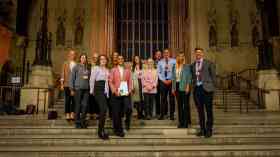Technology in schools is getting better
 Making her first speaking appearance at BETT, Education Secretary Nicky Morgan “For more than 30 years, BETT has been pushing the boundaries of technology. It has been the breeding ground for new ideas and technologies, and for the collaborations and partnerships that have nurtured them.
Making her first speaking appearance at BETT, Education Secretary Nicky Morgan “For more than 30 years, BETT has been pushing the boundaries of technology. It has been the breeding ground for new ideas and technologies, and for the collaborations and partnerships that have nurtured them.
“It has played host to some of the leading figures in learning technology, not just from the UK but around the world.
“And though we may not see the fruits for a few years yet, I know that here this week the educational technologies of the future are slowly coming to life.”
Morgan continued: “British businesses are leading the world in education technology, but I sometimes fear that the fruits of that success are not yet being shared by every school in the country. In part this is a failing of infrastructure.”
Wi-fi access
“According to last year’s annual survey by the British Educational Suppliers Association (BESA), 65 per cent of primary schools and 54 per cent of secondary schools don’t have access to a good wi-fi connection. A significant number reported that their broadband provision was poor.
This is something we need to address. And I’m pleased to say we’re doing so. I am delighted to be able to announce a further partnership with some of our leading technology firms like O2, Google, BT, IBM and HP collaborating with some of our best universities to train the next generation of computing teachers.
“Some of our top technology experts from these firms will be going into schools to train primary school teachers.”
The Department for Education has agreed to match fund all of the projects as part of a commitment to invest £3.5 million to support schools with the new computing curriculum.
The Keynote speeach by the Education Secretary was followed by a presentation from Jimmy Wales, founder of Wikipedia, who discussed how open‑source and open-content technology is changing the way we access information, and how educators can help their students take advantage.
Designing technology rollouts
Teachers must be put at the centre of designing technology roll-outs in their classrooms if they are to be successful, it has been claimed. Speaking at Bett 2015, Vicki Phillips, director of education at the Bill and Melinda Gates Foundation, said too often those involved in bringing technology into the classroom put their own needs above those of the students and their teachers.
According to Phillips, technology vendors often want to bring what’s easiest for them to roll out, scale and maintain, rather than what is best for the users, while school administrators look at the immediate cost.
“Technology can bring teachers and students closer together, but right now, teachers aren’t buyers,” she said, claiming they often have little or no input into the design process.
“The need for EdTech companies to listen to teachers is a bigger issue than it might seem,” she said, claiming that in the past reform movements that have focused on ‘planning, curriculum and materials’ rather than the needs of teachers. This causes early adopters to lose faith and abandon the project, and so it dies, according to Phillips.
“Technology alone can’t form a bond with students,” she said. “It can’t fan their interests, guide their projects, design their classrooms, or figure out what’s going on when students aren’t thriving.”
Blended Reality learning
Along with new devices and new initiatives for teaching and learning, HP demonstrated its vision for Blended Reality learning on its stand at Bett. HP’s Vice President for worldwide education, Gus Schmedlen, insists that Blended Reality combines the best of the physical world with the best of the digital, to create compelling new experiences that enhance teaching and learning.
HP also launched its National Education Technology Assessment Programme, a global initiative that is designed to ensure educational establishments have the IT tools they need to prepare students for the digital economy.
“What’s more important in a student? Soft skills, or 21st century skills? Flexibility and adaptability, creativity or reliability?” asked Schmedlen.
“We try to look at that and compare it to what the DfE says, and what the teachers and students say, and make sure the education system is built on the entire ecosystem, and not just what the policymakers think is the right idea,” he adds.
On the software side, Schmedlen talked up the firm’s HP Classroom Manager software product.
“It lets teachers block websites, or carry out instant assessment. Instead of trying to squeeze consumer or corporate products into education, we’ve created bespoke education models, built from the ground up and developed from the ground up for education.”
Maths in Motion
Maths in Motion, a joint initiative by Jaguar and Toshiba, encourages children to learn maths through a fun and original challenge: building an F1 racer. Open to schools around the world, pupils must use maths skills including geometry and algebra to design and build their own racing car.
The best cars from around the world then compete in a race to see which group of children has done the best job. A national final will be held at the Heritage Motor Centre, Gaydon, Warwickshire, on 24th June 2015.
Scanning Pens
Approved by The Joint Council for Qualifications to be used in exams, this handy orange pen helps students with difficulties such as dyslexia to read and understand questions.
The scanning technology instantly comprehends written text, displaying it on a larger L.E.D. screen and reading it aloud to the student through a built-in speaker or discreetly through headphones (meaning it can be used in an exam hall with other students). The device has already been deployed in Luckley House School and Blundell’s School.
Robots and Raspberry Pi
Initio from TTS is a robot that can be assembled and programmed by the students themselves.
The robot features Raspberry Pi, the credit card-sized single-board computer developed to help teach basic computer science in schools. Students can design their own programme and try it out on Initio, interacting wirelessly through wi-fi or by loading the programme directly using a USB.
Samsung Tablet
Samsung has produced a tablet that caters especially to the needs of classrooms, called the Galaxy Tab 4 Education.
The device integrates Google Play for Education, which provides access to a host of approved teaching content. It has high-performance specifications, running Android 4.4 Kit Kat and hosts both front and rear-facing cameras. The system runs dual-band wi-fi to maximise the number of potential users.
Acer Chromebooks
Acer showed off its first 15-inch Chromebook for education, an 11-inch model and two ultra short-throw projectors. The company launched the Acer Education Solution Centre program in 15 countries across EMEA last year, helping resellers sell more into schools. It also worked on a Future Classroom Lab which opened in November 2014 at Ricoh’s office in Hannover, featuring the latest hardware such as interactive whiteboards, projectors, notebooks and tablets with software solutions like the Acer Classroom Manager.
Bett Awards
The Bett Awards are a celebration of the inspiring creativity and innovation that can be found throughout technology for education. The awards form an integral part of Bett each year. Winners are seen to have excelled in ICT provision and support for nurseries, schools, colleges and special schools alike with a clear focus on what works in the classroom.
Among the winners (see panel on right for full list) ICT Company of the Year (between £1m and £10m turnover) was awarded to Frog Education.
In response to the removal of National Curriculum levels, Frog recently launched FrogProgress, an innovative tool which enables teachers to assess the progress of every pupil, setting them personal targets mapped against their expected attainment progress.
Commenting on the win, Gareth Davies, managing director of Frog Education, said: “We are delighted to receive this prestigious award as recognition of Frog’s continued commitment to providing world-class technology to improve both teaching and learning in the classroom. Frog Progress, our latest tool, is a huge step towards our vision of a personal learning journey for each and every child.”
Outstanding Achievement in ICT Education
Former Education Secretary Charles Clarke was recognised with the 2015 Outstanding Achievement in ICT Education award. Acepting the accolade, Clarke said: “The area that you are working in is unbelievably important for the future of our country, our country and everything else.
“We all know the world is changing in difficult and problematic ways. The only way to challenge that is through education so that our younger generation and our institutions can work out whats happening.
“Technology is an immensely powerful way of doing that, both in helping learning, but also in bringing parents, teachers and local communities together in powerful ways.
Clarke continued: “It’s an immense honour to get this award. I’ve tried through my political life to promote education, and technology in education, and the recognition of this award is a tremendous endorsement of that.
“Bett is an assembly of all the people who are working in this industry trying to improve the quality of education for our young people. That is such a powerful, motive force when you see children who feel they can understand things, command things and get on top of things because education, and particularly technology in education has helped them do that, so its a massive social achievement.”
Get set for next year
Bett 2016 takes place at the excel between January 27-30. For further information visit www.bettshow.com
Latest News
18/09/2025 - 09:33
A new report has been released which shines a light on the challenges young carers face in England’s education system, focusing on their disproportionately high rates of suspensions.
18/09/2025 - 09:23
A new Education Committee report calls for a "root and branch" transformation of the way mainstream education caters to children and young people with special educational needs and disabilities (SEND).
17/09/2025 - 14:22
Scottish Government statistics show the proportion of pupils learning in schools in good or satisfactory condition has increased to 92.5%, up from 92% since 2024.
17/09/2025 - 09:49
Thanks to a partnership between the Government and Colgate-Palmolive, over two million toothbrushes and tubes of toothpaste have been delivered to children in the most deprived areas of England.
16/09/2025 - 09:45
The Mayor of London, Sadiq Khan, has announced a funding of £810,000 to provide mental health support for up to 15,000 young Londoners in schools across the capital.







